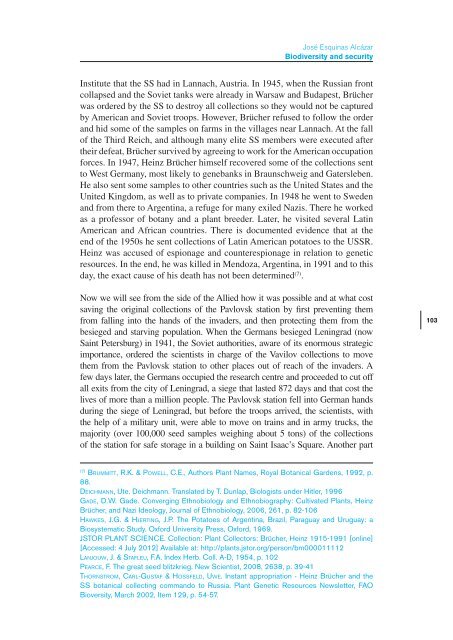Food security and global security - IEEE
Food security and global security - IEEE
Food security and global security - IEEE
- No tags were found...
You also want an ePaper? Increase the reach of your titles
YUMPU automatically turns print PDFs into web optimized ePapers that Google loves.
José Esquinas AlcázarBiodiversity <strong>and</strong> <strong>security</strong>Institute that the SS had in Lannach, Austria. In 1945, when the Russian frontcollapsed <strong>and</strong> the Soviet tanks were already in Warsaw <strong>and</strong> Budapest, Brücherwas ordered by the SS to destroy all collections so they would not be capturedby American <strong>and</strong> Soviet troops. However, Brücher refused to follow the order<strong>and</strong> hid some of the samples on farms in the villages near Lannach. At the fallof the Third Reich, <strong>and</strong> although many elite SS members were executed aftertheir defeat, Brücher survived by agreeing to work for the American occupationforces. In 1947, Heinz Brücher himself recovered some of the collections sentto West Germany, most likely to genebanks in Braunschweig <strong>and</strong> Gatersleben.He also sent some samples to other countries such as the United States <strong>and</strong> theUnited Kingdom, as well as to private companies. In 1948 he went to Sweden<strong>and</strong> from there to Argentina, a refuge for many exiled Nazis. There he workedas a professor of botany <strong>and</strong> a plant breeder. Later, he visited several LatinAmerican <strong>and</strong> African countries. There is documented evidence that at theend of the 1950s he sent collections of Latin American potatoes to the USSR.Heinz was accused of espionage <strong>and</strong> counterespionage in relation to geneticresources. In the end, he was killed in Mendoza, Argentina, in 1991 <strong>and</strong> to thisday, the exact cause of his death has not been determined (7) .Now we will see from the side of the Allied how it was possible <strong>and</strong> at what costsaving the original collections of the Pavlovsk station by first preventing themfrom falling into the h<strong>and</strong>s of the invaders, <strong>and</strong> then protecting them from thebesieged <strong>and</strong> starving population. When the Germans besieged Leningrad (nowSaint Petersburg) in 1941, the Soviet authorities, aware of its enormous strategicimportance, ordered the scientists in charge of the Vavilov collections to movethem from the Pavlovsk station to other places out of reach of the invaders. Afew days later, the Germans occupied the research centre <strong>and</strong> proceeded to cut offall exits from the city of Leningrad, a siege that lasted 872 days <strong>and</strong> that cost thelives of more than a million people. The Pavlovsk station fell into German h<strong>and</strong>sduring the siege of Leningrad, but before the troops arrived, the scientists, withthe help of a military unit, were able to move on trains <strong>and</strong> in army trucks, themajority (over 100,000 seed samples weighing about 5 tons) of the collectionsof the station for safe storage in a building on Saint Isaac’s Square. Another part103(7)Brummitt, R.K. & Powell, C.E., Authors Plant Names, Royal Botanical Gardens, 1992, p.88.Deichmann, Ute. Deichmann. Translated by T. Dunlap, Biologists under Hitler, 1996Gade, D.W. Gade. Converging Ethnobiology <strong>and</strong> Ethnobiography: Cultivated Plants, HeinzBrücher, <strong>and</strong> Nazi Ideology, Journal of Ethnobiology, 2006, 261, p. 82-106Hawkes, J.G. & Hjerting, J.P. The Potatoes of Argentina, Brazil, Paraguay <strong>and</strong> Uruguay: aBiosystematic Study. Oxford University Press, Oxford, 1969.JSTOR PLANT SCIENCE. Collection: Plant Collectors: Brücher, Heinz 1915-1991 [online][Accessed: 4 July 2012] Available at: http://plants.jstor.org/person/bm000011112Lanjouw, J. & Stafleu, F.A. Index Herb. Coll. A-D, 1954, p. 102Pearce, F. The great seed blitzkrieg. New Scientist, 2008, 2638, p. 39-41Thornstrom, Carl-Gustaf & Hossfeld, Uwe. Instant appropriation - Heinz Brücher <strong>and</strong> theSS botanical collecting comm<strong>and</strong>o to Russia. Plant Genetic Resources Newsletter, FAOBioversity, March 2002, Item 129, p. 54-57.
















